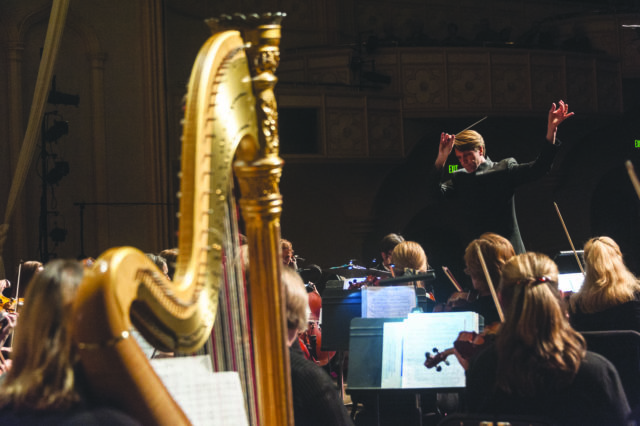
The Boulder Philharmonic Orchestra somewhat unexpectedly opens its 2019-20 season Saturday, Oct. 12, with music by two members of the Rock & Roll Hall of Fame, Jonny Greenwood of Radiohead and Jon Lord of Deep Purple.
Or maybe it’s not unexpected. “That sense of experimentation, of providing something offbeat — that is part of our identity,” Boulder Phil music director Michael Butterman says. “This program adheres to the approach that we’ve taken of presenting well-known works from the classical canon along with pieces likely to be a surprise.”
The work from the classical canon in this case is Schubert’s Fifth Symphony. Written when the composer was only 19, it is a lively and pleasant work that reflects Schubert’s admiration for Mozart.
In other words, it is worlds away from the Rock & Roll Hall of Fame.
The program is titled “Gritty/Pretty,” of which the gritty part is the suite from Greenwood’s score for the brutal film epic There Will Be Blood. “I didn’t come up with the [“Gritty/Pretty” title], Butterman says. “That’s marketing, but I kind of like it. I think it’s appropriate.”
Greenwood’s music is written for strings and the rare electronic instrument ondes martinot, which will be replaced by orchestral oboe. In spite of writing for a conventional string group, Butterman says, Greenwood “creates sounds that are unexpected, and kind of other-worldly. He asks the strings to use guitar picks, which creates a percussive effect that doesn’t sound like anything else.
“There are other things, like a really slow trill that creates a rumbling, undulating, unsettling feeling. At one point the players are holding a note, a big chord, and Greenwood says to increase the bow pressure and at the same time reduce the left hand (fingering) pressure so the note ‘corrodes and cracks.’
“He’s clearly got ideas about the kind of sound world he’s trying to get, (and) exploiting the full capacity of the resources at hand.”
If Greenwood is gritty, Lord’s suite for flute, strings and piano, To Notice Such Things, is pretty. Written in memory of Sir John Mortimer, a writer and close friend who died in 2009, the score takes its title from a poem by Thomas Hardy, suggesting that Mortimer noticed things that others did not.
Butterman first heard To Notice Such Things on the radio. “After I discovered what it was, I thought I’d like to know more,” he says. At that time it had not been published, but Butterman eventually got a copy directly from Lord through his manager. “It took quite a bit of doing, but I have my own set of parts that were forwarded from Lord.
“This is a piece that I have done a number of times. Much of it is very beautiful and lyrical music, and it certainly has a lightness to it.”
The suite comprises six movements that range from sweetly lyrical to fast and virtuosic in the flute part, which will be played by the Boulder Phil’s principal flutist, Elizabeth Sadilek-Labenski. “I was not even aware that it existed,” she says.
When Butterman suggested the piece to her, “I listened to it and just fell in love with it,” she says. “It really fits me as a player. There are definitely virtuosic places, but it’s written so well for the instrument that it’s not awkward in any way. It’s really a pleasure (to play).”
Schubert’s Fifth Symphony was the very first piece he ever wrote for pay, and one of the few symphonies out of his nine that he ever heard. “That’s incredible to think of,” Butterman says. “In the previous year he had written something like 140 songs. When he was 18, he was just writing, writing, writing — he wrote because it’s what he had to do.”
At the time, Schubert wrote in his journals of his love for Mozart’s music, and Butterman finds that reflected in the Fifth Symphony. “It is a piece that is brimming with his affection for Mozart,” he says. “You hear it in the third movement, a fast-driven, minor key minuet, a real echo of the third movement of Mozart’s Symphony No. 40.
“It’s a piece that I think no one could fail to enjoy. His gift for melody is certainly well represented in both the first and the second movement. The piece may not be specifically familiar, but the style, the approach, the general feeling of the symphony will be immediately recognizable. It’s an entirely charming piece.”
Butterman enjoys presenting Schubert’s tuneful, charming music alongside pieces by literal rock stars. “I am excited to share the unexpected and unfamiliar side of these two rock icons with our audience,” he says.
“I think it’s remarkable that their music can share a program with the young Schubert.”














